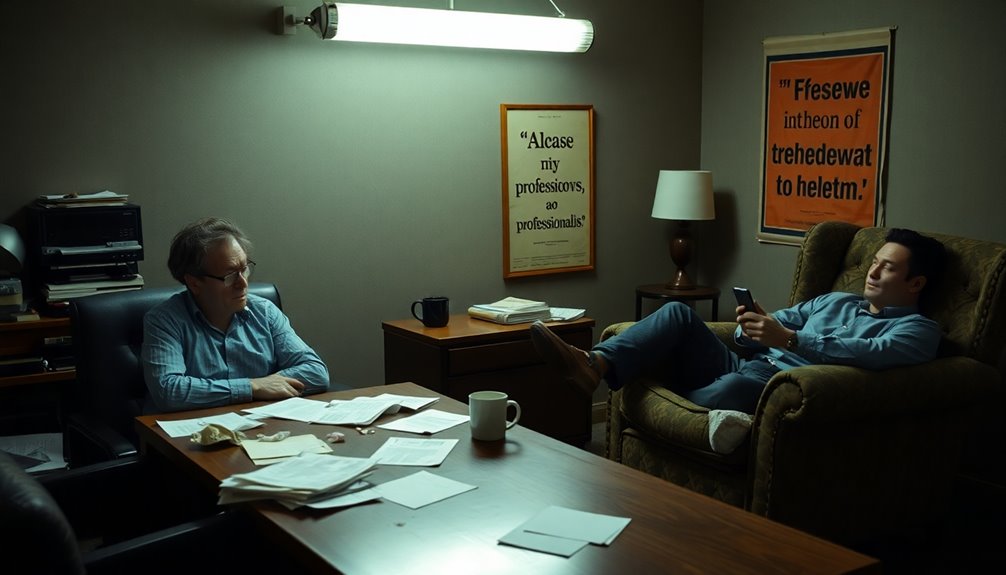A job interview isn't just a formality; it's a vital dialogue that uncovers the essence of both you and the employer. It serves as a two-way evaluation where first impressions matter. Your personal image and professionalism roll into this mix, influencing how recruiters perceive you. Preparing by understanding the company's culture and aligning your strengths is essential. Plus, steering through your weaknesses with honesty reflects dedication to growth. Remember, unprofessional behavior from anyone can sour the experience. The exchange is more than questions and answers; it's about fit and connection. Stick around, and you might uncover even more insights!
Key Takeaways
- A job interview is a mutual evaluation where both the candidate and employer assess fit and compatibility.
- The interview environment impacts performance; a welcoming atmosphere reduces stress and fosters open communication.
- Professionalism and personal image play crucial roles in creating lasting positive impressions during interviews.
- Understanding the company's culture and values is essential for aligning personal strengths with organizational needs.
- Practicing interview scenarios and preparing for unexpected questions boosts confidence and demonstrates adaptability.
The True Nature of Interviews

Job interviews are more than just a one-sided evaluation; they're a two-way street where both you and the employer determine fit and culture. While you prepare to answer interview questions that showcase your qualifications and skills, remember that you're also judging whether this company aligns with your values and career goals.
A welcoming interview environment can make a world of difference in your performance. If the atmosphere feels intimidating, it might raise your stress levels and prevent genuine interaction. Both parties should maintain professional conduct; unprofessional behavior can leave a lasting negative impression on you and the organization.
When it comes to interview questions, relevance is key. Inappropriate or irrelevant queries can create discomfort and detract from your experience. You want to engage in a dialogue that reflects your expertise while also allowing you to evaluate the role and culture. Demonstrating strong communication skills during the interview can significantly enhance clarity and rapport.
Lastly, clear communication throughout the process—like timely follow-ups and feedback—is essential. It keeps you engaged and shows respect for your time and effort. Remember, an interview is as much about you finding the right fit as it is about the employer judging your potential.
Impact of Personal Image

Your personal image can considerably influence how recruiters perceive you during an interview. When you filter out excessive personal details and focus on relevant experiences, you present a more professional persona. Remember, sharing too much personal information can distract from showcasing your qualifications and skills.
Professional Persona Matters
Creating a strong professional persona is essential for making a positive impression during interviews. Your ability to present relevant experiences while maintaining an air of professionalism can greatly impact your candidacy. Avoid sharing excessive personal details, like vacation stories or divorce, as they can detract from your qualifications. Instead, focus on filtering experiences that align with the job requirements.
| Key Elements | Importance |
|---|---|
| Relevant Experiences | Aligns with job requirements |
| Professional Attire | Enhances perception of professionalism |
| Self-Awareness | Acknowledges weaknesses maturely |
Recruiters prioritize candidates who exhibit self-awareness and professionalism. Presenting a polished CV and dressing appropriately signals that you take the opportunity seriously. During the interview, maintain professional conduct and limit family involvement unless necessary. This approach not only demonstrates maturity but also enhances your suitability for the workplace. Additionally, showcasing your ability to manage stress can further highlight your readiness for remote work environments. Remember, the professional persona you project during the interview can set you apart from the competition.
Relevant Information Filtering
Filtering relevant information during an interview is crucial for shaping a strong personal image. When you focus on what truly matters, you enhance your professional persona and guarantee you present your qualifications effectively. Candidates often make the mistake of sharing excessive personal details, like struggles or vacations, which can distract interviewers from evaluating what you bring to the table.
By prioritizing relevant information filtering, you can highlight experiences that directly relate to the job and demonstrate your suitability for the workplace. Recruiters appreciate candidates who maintain a professional demeanor, as it signals their ability to align with industry expectations and role requirements.
Think about what information supports your candidacy and keeps the conversation focused on your skills and accomplishments. Avoid discussing personal matters that don't contribute to your professional narrative. Instead, emphasize achievements and experiences that reflect your qualifications.
In doing so, you'll not only make a great impression but also increase your chances of landing the job. Remember, your goal is to showcase the best version of yourself—one that resonates with both the role and the company culture.
Personal Details Distraction
Excessive sharing of personal details during a job interview can greatly undermine your professional image. When you discuss personal life events, like divorces or vacations, you risk shifting the focus away from your qualifications. Interviewers want to see a polished professional persona, so it's vital to filter the personal information you share.
Instead of diving into irrelevant anecdotes, identify areas for improvement in how you present your experiences. Prepare by highlighting your relevant qualifications and achievements that justify your candidacy. Personal stories can enhance your narrative, but only if they align with your professional goals.
Maintaining a professional demeanor throughout the interview is key. If personal distractions dominate the conversation, it can negatively impact how interviewers perceive your readiness for the role. They might question your suitability if they sense you're more focused on personal matters than your career aspirations.
Ultimately, the goal is to guarantee that your personal details complement, rather than overshadow, your professional image. By staying focused on relevant experiences, you'll make a stronger impression and increase your chances of landing the job.
Navigating Weaknesses Professionally

Self-awareness is a critical trait that can set you apart in a job interview, especially when discussing weaknesses. Acknowledging your weaknesses shows honesty and growth potential, distinguishing you from candidates who claim they have none.
To navigate this topic effectively, consider these four strategies:
- Identify Relevant Weaknesses: Reflect on weaknesses directly related to the role or industry. This context helps recruiters see your awareness of the position.
- Use Tools for Insight: Utilize personality questionnaires or self-assessments to pinpoint areas for improvement. This can lead to more informed discussions during the interview.
- Frame Your Weaknesses Positively: Prepare thoughtful responses that highlight your commitment to personal and professional development. Emphasize what you're doing to improve.
- Demonstrate Willingness to Learn: Honest acknowledgment of your weaknesses enhances your credibility. It shows recruiters you're open to feedback and adaptable in a professional environment. Additionally, practicing mindfulness can help you manage stress during the interview process, fostering a more relaxed and authentic conversation about your weaknesses.
Mindfulness practices can significantly improve your ability to reflect on challenges and communicate your growth effectively.
Importance of Preparation

Preparing for a job interview is essential, and it starts with researching the company culture to align your responses effectively. You should practice common questions to articulate your skills clearly and tailor your answers to what the employer values. By doing this, you'll boost your confidence and make a strong impression during the interview.
Research Company Culture
Researching a company's culture is essential for any job candidate. Understanding the culture not only helps you align your responses during the interview but also showcases your interest in the organization. Here are four effective ways to research company culture:
- Explore Employee Reviews: Check platforms like Glassdoor to read employee testimonials. These insights reveal the work environment and employee satisfaction levels.
- Know the Mission and Values: Familiarize yourself with the company's mission, vision, and core values. This knowledge allows you to highlight how your strengths align with the organization's objectives.
- Network with Employees: Reach out to current or former employees on LinkedIn. Their firsthand accounts can provide valuable insights into the company culture, helping you prepare relevant questions.
- Assess Cultural Fit: Companies often evaluate cultural fit during interviews. Being well-informed about the organization's dynamics enables you to present yourself as a suitable addition to their team.
Practice Common Questions
Frequently practicing common interview questions can greatly boost your confidence and help you articulate your qualifications more effectively. When you take the time to practice common questions, you turn vague thoughts into clear, concrete examples that showcase your skills and experiences. This preparation allows you to align your answers with the specific job requirements, making you a more appealing candidate.
Utilizing tools like mock interviews or seeking feedback from peers can markedly enhance your performance. These methods not only help you refine your answers but also reduce anxiety during the actual interview. You'll find that familiarizing yourself with potential unexpected scenarios, such as surprise tasks, is vital for demonstrating your adaptability.
Additionally, practicing common questions helps you navigate the interview flow smoothly, ensuring that you're not caught off guard. By doing this, you'll feel more relaxed and focused, allowing your personality and qualifications to shine through. Ultimately, the more you practice, the better prepared you'll be to tackle any question that comes your way, making a lasting impression on your potential employer. Furthermore, maintaining a strong support network can provide emotional reassurance and encouragement throughout the interview process.
Tailor Your Responses
Tailoring your responses during an interview can make all the difference in how you're perceived by potential employers. To guarantee your answers resonate, focus on these key strategies:
- Research the Company: Understand their needs and culture. Align your strengths with what they're looking for.
- Use Concrete Examples: Illustrate your skills with specific experiences that relate directly to the job description. This boosts your credibility.
- Prepare for the Unexpected: Anticipate surprise questions or tasks. This preparation not only reduces stress but also showcases your adaptability.
- Practice Your Responses: Work through common interview questions and consider using personality questionnaires to gain insights into your communication style.
Unprofessional Conduct and Expectations

Experiencing unprofessional conduct during job interviews can leave a lasting negative impression on candidates. When interviewers laugh at standard questions or use aggressive questioning techniques, it can greatly undermine your confidence and how you perceive the organization. Many candidates report encounters with rude or dismissive interviewers, emphasizing the importance of respectful communication to enhance the overall interview experience.
Inappropriate personal questions, such as those about your physical attributes or relationship status, not only reflect a lack of professionalism but also create discomfort and potential feelings of discrimination. Additionally, chaotic group interview environments often pressure you to compete against peers rather than allowing you to showcase your unique qualifications, which detracts from the assessment process.
To guarantee a productive and respectful interview atmosphere, clear communication and professionalism from both candidates and interviewers are vital. You deserve an interview experience that accurately reflects the company's values and culture. Remember, professionalism sets the tone for the entire process, and recognizing unprofessional conduct is essential in evaluating whether the organization aligns with your expectations and standards.
Understanding Company Culture

Understanding company culture is essential for making an informed decision about your potential employer. Company culture shapes how you'll interact with colleagues and influences your job satisfaction and productivity. When evaluating a workplace, consider these key aspects:
- Values and Beliefs: What principles does the company prioritize? This often reflects in their mission statement.
- Work Environment: Is it collaborative or competitive? A positive environment can greatly impact your daily experience.
- Employee Retention: Strong company cultures lead to lower turnover rates. Organizations with positive cultures see up to 30% lower turnover compared to negative ones.
- Communication Channels: Look at how the company presents itself on social media and in job descriptions. These platforms often reveal a lot about the company culture.
Engaging with current employees through informational interviews or networking can also offer valuable insights. By understanding company culture, you'll be better equipped to evaluate whether your personal values align with the organization's ethos. This knowledge not only helps you during the interview process but also positions you for long-term success and satisfaction in your career.
Frequently Asked Questions
How to Know if an Interview Went Badly?
To know if an interview went badly, pay attention to the interviewer's demeanor and questions. If they ask irrelevant personal questions, use casual language, or display rudeness, it's a red flag. You might feel anxious if unprepared for unexpected tasks. Finally, if you don't receive follow-up communication, it could indicate the interview didn't meet their expectations. Trust your instincts; if you felt uncomfortable, it likely didn't go well.
What Are the Five C's to Remember in an Interview?
When you're preparing for an interview, remember the five C's: Clarity, Communication, Confidence, Competence, and Courtesy. Make sure you understand the job description fully, so you can tailor your responses. Communicate professionally and purposefully throughout the interview. Show confidence in your skills, and provide concrete examples of your achievements. Finally, always be courteous to your interviewers; respectful behavior leaves a positive impression and can greatly influence their perception of you.
Should I Accept an Interview for a Job I Don't Want?
If you're considering accepting an interview for a job you don't want, think about the potential benefits. It can sharpen your interview skills and expand your network. You'll also gain insights into different company cultures, helping clarify your career goals. Even if you're not interested, approaching the interview professionally can leave a positive impression and open doors for future opportunities. However, if it feels like a waste, it's okay to decline.
What to Do if You Think Interview Was Unfair?
If you think an interview was unfair, start by documenting specific instances of unprofessional behavior or irrelevant questions. Reach out to the hiring manager or HR, expressing your concerns respectfully about how the interview didn't meet professional standards. Seek feedback from peers or mentors to gain perspective on your experience. If you noticed discriminatory practices, report them to the proper authorities. Finally, reflect on the interview to identify areas for improvement in future opportunities.
Conclusion
In the end, a job interview isn't just a test; it's a dance of personalities and skills. You've got to shine like a diamond, showcasing your true self while understanding the rhythm of the company culture. By preparing well and facing your weaknesses head-on, you'll not only impress but also find a place where you truly belong. So, step onto that stage with confidence, and let your unique light guide you to success!
Felicity, our Author, pens in-depth articles and guides that delve into the heart of personal discovery. Her narrative-driven approach weaves together theory, practice, and personal anecdotes, making the journey of self-exploration both relatable and inspiring. Felicity’s contributions help illuminate the path for those seeking a deeper understanding of themselves and their relationships.










